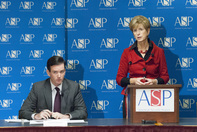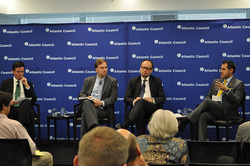Economists for Peace and Security Symposium: Policy Challenges for the New US President
Energy Security in the Caribbean: Unique Challenges
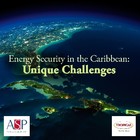
On Wednesday, February 4th 2015, the American Security Project hosted a half-day conference examining energy security in the Caribbean. Nearly 100 experts from academia, International Financial Institutions, the US government, and private corporations attended the conference.
Holland was a featured speaker, discussing how the islands of the Caribbean have been presented an opportunity to enhance their energy security, and the US will help them make it happen.
Holland was a featured speaker, discussing how the islands of the Caribbean have been presented an opportunity to enhance their energy security, and the US will help them make it happen.
Testimony before House Foreign Affairs Committee, Subcommittee on Europe, Eurasia, and Emerging Threats:
|
On Wednesday, December 10, 2014, Andrew Holland, ASP’s Senior Fellow for Energy and Climate, testified before the House Subcommittee on Europe, Eurasia, and Emerging Threats. The hearing, “The United States as an Arctic Nation: Opportunities in the High North” took place in 2200 Rayburn House Office Building Washington.
In his opening statement, Holland said: Today, melting ice is opening the Arctic. The administration has made climate change in the Arctic a focus of the US Arctic Council Chairmanship – and that is appropriate. But we must do more. The unraveling of the Arctic will have huge costs to all of us. I am concerned that U.S. policies must go much further in planning for an opening Arctic. Holland's testimony begins at 2:30 in the video. You can also read his full statement for the record. |
The Green Side of Energy Security: Event at the EU Mission - October 22, 2014
|
|
Holland was a featured panelist at an event highlighting both energy security and climate policy at the EU mission to the U.S. He followed Ambassador João Vale de Almeida and Amos J. Hochstein, Acting Special Envoy a the State Department's Bureau of Energy Resources. The video is embedded.
|
UCF Community Summit on Environment and Global Climate Change - March 25, 2014
Holland spoke to a group of students and faculty at the University of Central Florida about the impacts of climate change on national security, and how the military is planning for climate change.
America’s Energy Choices - January 28, 2014

Andrew Holland spoke in a panel discussion about the future of energy policy in the U.S. He suggested the history of energy transitions often occur abruptly, alluding to the current shale oil boom taking place in the United States. Holland pointed out the discussion regarding energy in the U.S. has managed to coast on choices that were made in the 1970s. The theme of the event circulated around this notion that an energy policy choice must be made if the U.S. is to move forward in the coming decade.
Climate Change and Security - A Briefing of the informal group on climate of U.S. Senators - April 9, 2013

On April 9, Andrew gave an off the record briefing to a select group of Senators, including Senators Boxer, Whitehouse, Franken, Shaheen, Hirono, and others. He spoke about how climate change threatens U.S. infrastructure and how it threatens global security. He noted that elements of the U.S. Department of Defense are actively preparing for it.
The Washington & Jefferson College, Center for Energy Policy and Management, 2013 Energy Summit: "U.S. Energy Security: How Do We Get There?"

On April 4, Andrew participated in a conference in Washington, PA about U.S. Energy Security. He spoke in a panel discussion on "U.S. Energy Security and the Unconventional Oil Boom." The event featured panelists from industry and academia, as well as retired Air Force General Chuck Wald.
"International Conference on Climate Security in the Asia-Pacific Region" March 21-22, 2013, Seoul
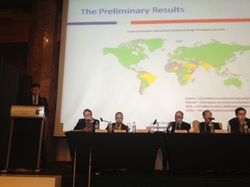
On March 21, Andrew traveled to Seoul, South Korea to participate in a major international conference on the impacts of climate change and security. He presented the preliminary findings of ASP's new "Climate Change and Global Security Defense Index" to the participants. Also attending were senior government officials from the UK, Germany, and South Korea. A full write-up of the International Conference on Climate Security in the Asia-Pacific Region is available from the South Korean Ministry of Foreign Affairs below.
| broachure_on_international_conference_on_climate_security_in_the_asia-pacific_region.pdf |
Washington Clean Technology Conference, "Clean Energy, the New Public Policy Reality"

On January 28, ASP and the Washington Clean Technology Alliance (WCTA) hosted an event in Seattle, WA entitled “Clean Energy: The New Public Policy Reality.” The event featured several prominent speakers including former Secretary of Defense Robert Gates; Sharon Burke, Assistant Secretary of Defense for Operational Energy Plans and Programs; Washington’s Governor Jay Inslee; Congressman Adam Smith (WA-09); as well as ASP’s own BGen Steve Cheney and Andrew Holland.
To listen to the full audio, click here.
To listen to the full audio, click here.
Association of Opinion Journalists Conference: "Climate Change Threatens National Security"
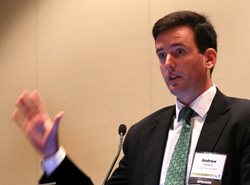
On Saturday, September 22, Andrew spoke to a gathering of about 100 opinion writers from around the country in Orlando, FL. He rejected climate change skeptics immediately. "In order to get beyond the political debate about this, it's important to start with some facts. The record is indisputable that the world is warming," he said.
Climate change does not cause wars and other crises, he explained, but contributes to the underlying problems. It is an accelerant of instability and unpredictability around the world. That becomes a challenge for America, which is a leader in a global community and has forward-depoyed armed forces around the world.
Climate change does not cause wars and other crises, he explained, but contributes to the underlying problems. It is an accelerant of instability and unpredictability around the world. That becomes a challenge for America, which is a leader in a global community and has forward-depoyed armed forces around the world.
"Returning R&D Investment to a National Priority"
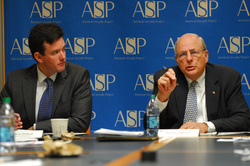
On Friday, January 20, 2012, Andrew participated in an event at the American Security Project with Norm Augustine, a member of ASP’s board and one of the country’s leading businessmen, to mark the launch of a letter to Congressional leadership on the importance of funding for basic R&D as well as a fact-sheet “Research and Development as a National Priority.”
Launch Event: "America's Energy Choices"

On Tuesday, August 2, 2011, the American Security Project officially launched a new white paper “America’s Energy Choices” . This report marks an effort by ASP to begin to outline a new way of looking at how America uses and produces energy. To mark the launch, ASP held a lunch roundtable with a select group of speakers from around Washington.
The reason for putting this comprehensive report together is that there is a disconnect in the way America talks about energy. The problem with American discourse on energy today is that arguments about energy are too often based on which will ‘sell’ the best in order to fit a decision already made. These argument are not meant to be balanced – they are poll-driven and appeal to people’s basest fears and desires. The report says that, instead, policymakers should look at the all options and weigh the trade-offs for each. Because the truth is there are trade-offs – decision makers should not pretend there are silver bullets that will automatically bring cheap, clean, domestic energy to all.
The report maintains that the proper way to address the debate about energy is to balance three main concerns:
1. Energy Security
2. Economic Stability
3. Environmental Sustainability
There are three broad categories of energy the U.S. has to choose from, including: fossil fuels, nuclear energy, and renewable power. Within each of those categories is a range of several choices.
The reason for putting this comprehensive report together is that there is a disconnect in the way America talks about energy. The problem with American discourse on energy today is that arguments about energy are too often based on which will ‘sell’ the best in order to fit a decision already made. These argument are not meant to be balanced – they are poll-driven and appeal to people’s basest fears and desires. The report says that, instead, policymakers should look at the all options and weigh the trade-offs for each. Because the truth is there are trade-offs – decision makers should not pretend there are silver bullets that will automatically bring cheap, clean, domestic energy to all.
The report maintains that the proper way to address the debate about energy is to balance three main concerns:
1. Energy Security
2. Economic Stability
3. Environmental Sustainability
There are three broad categories of energy the U.S. has to choose from, including: fossil fuels, nuclear energy, and renewable power. Within each of those categories is a range of several choices.
"Americas Future Energy Choices" - Washington

On Tuesday, May 24, 2011, Andrew spoke at a small, expert-level round table event organized by the American Security Project. Andrew is working on a project looking at the choices that the United States will face in how it powers its economy.
The United States is facing a series of choices over the next 5 years that will determine how its economy is powered for the next 25 years. By 2035, the United States will have to meet a 30% increase in electricity demand in a world where total energy demand has risen by 50%. Meanwhile, rising energy prices, depleting resources, concerns about climate change, and issues of national security will make those decisions much more difficult than the choices of the 20th Century. The government, utilities, and private sector of the United States should consider these decisions in lights of three concerns: energy security, economic stability, and environmental sustainability. In light of these three concerns, Andrew's presentation weighed the costs and benefits of America's energy choices, including coal, oil, nuclear, wind, solar, biomass, ethanol, and others. The United States should consider its choices in a holistic manner, not in its traditional way.
The United States is facing a series of choices over the next 5 years that will determine how its economy is powered for the next 25 years. By 2035, the United States will have to meet a 30% increase in electricity demand in a world where total energy demand has risen by 50%. Meanwhile, rising energy prices, depleting resources, concerns about climate change, and issues of national security will make those decisions much more difficult than the choices of the 20th Century. The government, utilities, and private sector of the United States should consider these decisions in lights of three concerns: energy security, economic stability, and environmental sustainability. In light of these three concerns, Andrew's presentation weighed the costs and benefits of America's energy choices, including coal, oil, nuclear, wind, solar, biomass, ethanol, and others. The United States should consider its choices in a holistic manner, not in its traditional way.
"Security Aspects of Climate Change in the Asia-Pacific" - Seoul
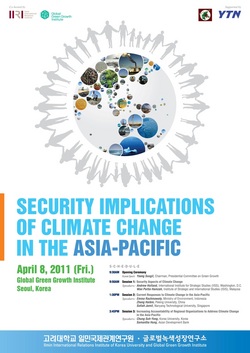
On Friday, April 8, 2011, Andrew was a featured speaker at a conference titled "Security Implications of Climate Change in the Asia Pacific" in Seoul, Korea. This event was co-hosted by Ilmin International Relations Institute of Korea University and the Global Green Growth Institute, with funding from the Ford Foundation through the Consortium of Non-Traditional Security Studies in Asia.
Andrew spoke immediately following the keynote speech given by Young Soogil, the Chairman of the Korean Presidential Committee on Green Growth. The full agenda can be found here. Andrew's presentation focused on how climate change will impact regional stability and security throughout East Asia. He highlighted changes in water supplies, reduced food security, and an increased incidence of natural disasters as possible changes that would impact regional security. Together, these threats could increase military deployments around the region and reduce national abilities to adapt to climate change. A full write-up of the event is available here.
The content of Andrew's presentation will also be included as a part of the Global Green Growth Institute's report. The other participants in the conference came from across the Asia-Pacific region and included Wan Portia Hamzah of Malaysia's Institute of Strategic and International Studies (ISIS), Zhang Haibin, Associate Professor of the School of International Studies at Peking University, Sofiah Jamil, Associate Research Fellow at the Centre for NTS Studies at the S. Rajaratnam School of International Studies (RSIS), and Samantha Hung of the Asian Development Bank. The conference was organized by Professor Chung Suh-Yong of Korea University.
Andrew spoke immediately following the keynote speech given by Young Soogil, the Chairman of the Korean Presidential Committee on Green Growth. The full agenda can be found here. Andrew's presentation focused on how climate change will impact regional stability and security throughout East Asia. He highlighted changes in water supplies, reduced food security, and an increased incidence of natural disasters as possible changes that would impact regional security. Together, these threats could increase military deployments around the region and reduce national abilities to adapt to climate change. A full write-up of the event is available here.
The content of Andrew's presentation will also be included as a part of the Global Green Growth Institute's report. The other participants in the conference came from across the Asia-Pacific region and included Wan Portia Hamzah of Malaysia's Institute of Strategic and International Studies (ISIS), Zhang Haibin, Associate Professor of the School of International Studies at Peking University, Sofiah Jamil, Associate Research Fellow at the Centre for NTS Studies at the S. Rajaratnam School of International Studies (RSIS), and Samantha Hung of the Asian Development Bank. The conference was organized by Professor Chung Suh-Yong of Korea University.
"The Future of the Arctic" - Washington DC
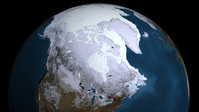
On February 2, 2011, Andrew was featured as part of a panel discussion at a conference titled "The Future of the Arctic" held in Washington DC at the Johns Hopkins University School of Advanced International Studies (SAIS). Andrew addressed a crowd of approximately 70 participants, including Arctic experts, government representatives from the five Arctic states, and graduate students. He was a part of the panel "The Research Void: Can nations still make good policy without conclusive science?" moderated by Professor Ruth Wedgewood, Director of SAIS' International Law program. More detail about the conference is available through SAIS' website.
"Launch of the Final Report of the Transatlantic Dialogue on Climate Change and Security" - Washington DC
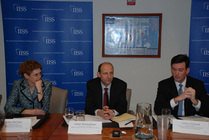
On January 26, 2011 Andrew spoke to an expert-level group at the IISS-US office in Washington, DC about how climate change will affect security around the world. This event marked the launch of the IISS' report on Climate Change and Security (download it here). Esther McClure, the Strategy Action Officer for Arctic, Energy and Environmental Policy in the Office of the Secretary of Defence - Policy was co-panelist, and she gave an overview of what how the Pentagon is looking at climate change (left, in the picture). A short summary of the event, including Andrew's prepared remarks, is available on the IISS' climate security blog.
"The Global Security Implications of Climate Change" - Brussels
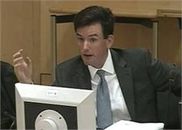
On May 28, 2010, Andrew was a panelist at the Capstone Conference of the IISS' Transatlantic Dialogue on Climate Change and Security in Brussels. He spoke as part of a panel discussion on how energy security will be affected by climate change. His co-panelist was Dr. Cho Kong, Chief Political Analyst for Shell International. The conference took place in the Berlaymont building, the headquarters of the European Commission and was attended by a group of 90 experts in water, food, and energy security along with government and military professionals from both sides of the Atlantic. Video of Andrew's panel is available courtesy of the European Commission here.
